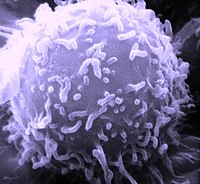
Photo from wikipedia
Nucleophosmin1 (NPM1) is one of the most commonly mutated genes in AML and is often associated with a favourable prognosis. Immune responses play an increasing role in AML treatment decisions;… Click to show full abstract
Nucleophosmin1 (NPM1) is one of the most commonly mutated genes in AML and is often associated with a favourable prognosis. Immune responses play an increasing role in AML treatment decisions; however, the role of immune checkpoint inhibition is still not clear. To address this, we investigated specific immune responses against NPM1, and three other leukaemia‐associated antigens (LAA), PRAME, Wilms' tumour 1 and RHAMM in AML patients. We investigated T cell responses against leukaemic progenitor/stem cells (LPC/LSC) using colony‐forming immunoassays and flow cytometry. We examined whether immune checkpoint inhibition with the anti‐programmed death 1 antibody increases the immune response against stem cell‐like cells, comparing cells from NPM1 mutated and NPM1 wild‐type AML patients. We found that the anti‐PD‐1 antibody, nivolumab, increases LAA stimulated cytotoxic T lymphocytes and the cytotoxic effect against LPC/LSC. The effect was strongest against NPM1mut cells when the immunogenic epitope was derived from the mutated region of NPM1 and these effects were enhanced through the addition of anti‐PD‐1. The data suggest that patients with NPM1 mutated AML could be treated with the immune checkpoint inhibitor anti‐PD‐1 and that this treatment combined with NPM1‐mutation specific directed immunotherapy could be even more effective for this unique group of patients.
Journal Title: British Journal of Haematology
Year Published: 2022
Link to full text (if available)
Share on Social Media: Sign Up to like & get
recommendations!